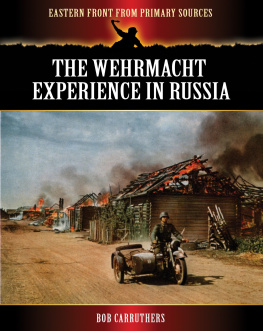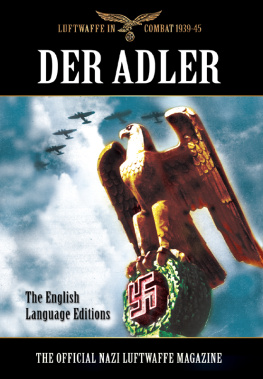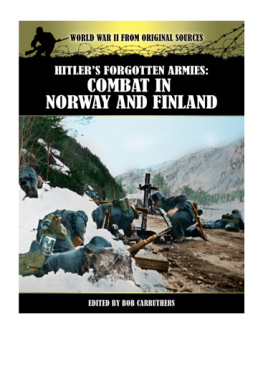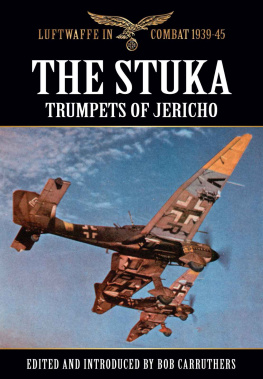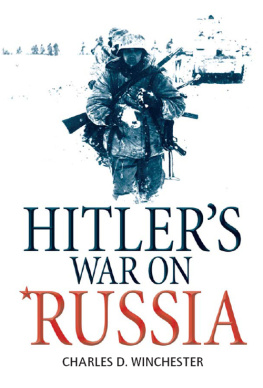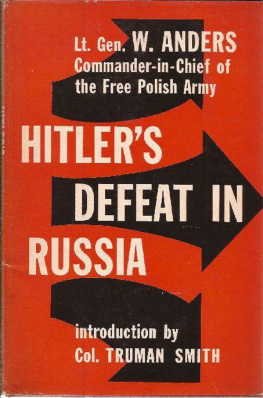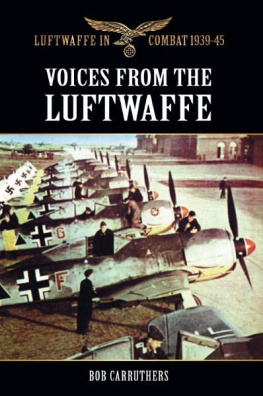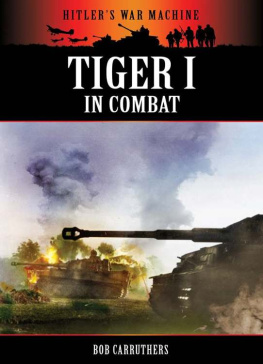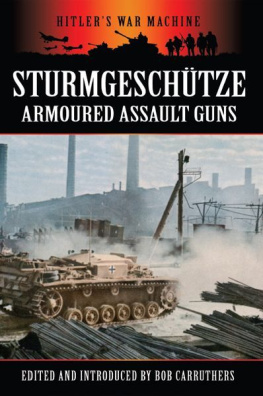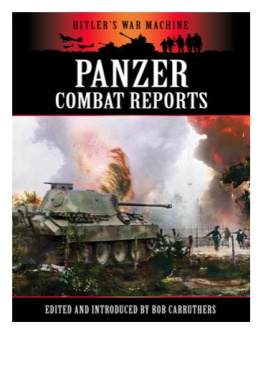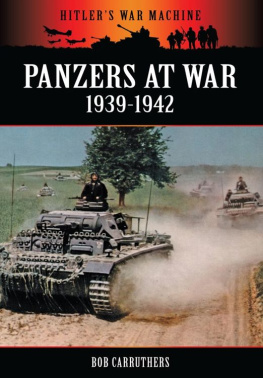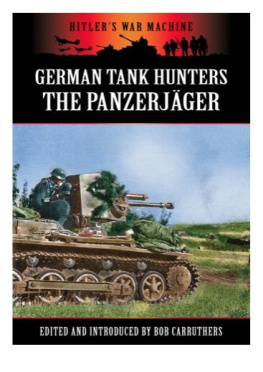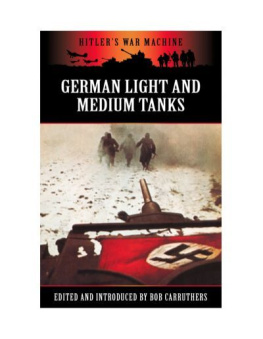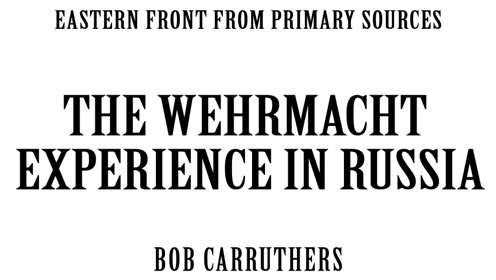

This eBook edition published in Great Britain in 2012 by
Coda Books Ltd, The Barn, Cutlers Farm Business Centre, Edstone, Wootton Wawen, Henley in Arden, Warwickshire, B95 6DJ
www.codabooks.com
Copyright 2012 Coda Books Ltd
The moral right of Bob Carruthers to be identified as the author of this work has been asserted in accordance with the Copyright, Designs and Patents Act, 1988.
All rights reserved. No part of this publication may be reproduced or transmitted in any form or by any means, electronic or mechanical, including photocopy, recording, or any information storage and retrieval system, without permission in writing from the publisher.
A CIP catalogue record for this book is available from the British Library.
ISBN: 978 1 78158 115 5
INTRODUCTION
I began work on this book in the same century as the events which are described. During the 1980s and 1990s I was privileged to conduct a fascinating series of interviews with German veterans of all three branches of the Wehrmacht. Some of those interviews were incorporated into a number of television series which are still aired around the world today. The interviews were also transcribed and appeared in books designed to accompany the television series. Many of the books are long out of print, and looked destined to remain so, until the advent of the e-book.
The Wehrmacht In Russia became a big seller in e-Book form in 2011 and it heralded a much needed renaissance of sales of military history titles as arm-chair military historians began to migrate to electronic readers in significant numbers from that year onwards. Im pleased to report that the trend has continued and the market is now big enough to support small niche publishers such as Coda Books who have been kind enough to provide a home for my work in the digital era.
The book you are now reading is drawn from three main sources. The first are those interviews conducted mainly in Hamburg area with veterans of the Wehrmacht-Heer, the Waffen-SS and the Luftwaffe. The Kreigsmarine interviews were conducted chiefly among U-boat men at Laboe and Bremen. Sadly the many of early interviews were not recorded on film but were transcribed from my hand written notes. Thankfully, the later interviews were all filmed; they were expertly produced and translated by Michael Leighton. The men who were interviewed were then in their 60s and 70s. They are a hardy bunch and a good few are still with us. It is my eternal regret that other matters took up my time and the interview process halted in 2001 and a good deal of primary testament has vanished with those who left the stage before we could catch up with them.
The second main source is the much expanded text of The Wehrmacht in Russia; some of this material first appeared in a book entitled The Russian Front written in collaboration with the late professor John Erikson. Professor Erikson was of course, the renowned author of The Road to Stalingrad and The Road to Berlin, which are still regarded as the definitive texts on the war in Russia. John was introduced to me by the pioneering film maker David McWhinnie whose Lamancha company led the way in the production military documentaries on television and on, what was then, the infant VHS system. John frequently appeared before our cameras and his incisive commentary became a vital part of the many successful collaborations between the three of us. Johns endorsement of my writing meant a great deal to me and it is still something I treasure to this day.
The final piece of the jigsaw is the pamphlets published by the US Army Historical Records section. I really cannot praise this series highly enough. These pamphlets, published in the fifties, were based on interviews with the senior participants. Their clear explanations of the strategic and operational aspects dovetailed beautifully with the recollections of the memoirs of the front line veterans from my own interview programme who tended to have a view from the trench.
Following the final collapse an unconditional surrender of the Wehrmacht in May 1945 the long hoped for peace in Europe had finally arrived. Unfortunately the tensions, which soon developed into the cold war, appeared almost immediately. As relations between the former allies cooled the prospect of an armed clash loomed on the horizon Britain and America had to face up to the possibility that they could soon find themselves lining up alongside the men of the recently defeated Wehrmacht in a fight to the death with Red Army.
With that appalling prospect in mind the pool of hard won knowledge which existed in the upper echelons of the Wehrmacht was invaluable and had to be collected and systematically recycled to the US and British forces as quickly and as thoroughly as possible.
Senior Luftwaffe figures such as Adolf Galland were to prove extremely valuable in delivering the crucial experience of the war in the air. The material for this and other studies of World War II on land was prepared by a group of former German generals and general staff officers including the indomitable Erhard Raus. The extensive interview programme eventually appeared as the German Report Series and today they represent a fascinating glimpse from the strategic and operational viewpoint of the war in the east which is missing from my own interview programme.
The German officers, who had witnessed the events at first hand, wrote these unique publications and they are told exclusively from the German point of view. The principal author was former Brig. Gen. Alfred Toppe, he and most of his associates served for extended periods on the Russian Front during World War II. Most of the group could boast combined experience of combat and staff work. Crucially most of them held assignments involving troop training, which would prove invaluable in the event that US or British forces might have to cross swords with the Soviets.
There is therefore a strong emphasis on not just absorbing the lessons, but also on learning for the future which runs as a theme throughout the German Report series. The writers were only too aware that had political events taken the wrong turn the next stage in this process might have been the preparation of actual training manuals for GIs on their way to a second Russian Front.
The US Foreign Studies Branch, Special Studies Division, and Office of the Chief of Military History carried out the original editing of many of those studies. The draft translation of each the original German texts was first revised and then reorganized in the interest of brevity, clarity, and pertinence. In this process every effort was made by the original editors to retain the point of view, the expressions, and even the prejudices of the German authors. To modern readers some of the sentiments may appear unreconstructed and extremely hostile, as such they are clearly of their time but they do represent a real wealth of detail on the war in the east from an original point of view, with the passing time the sources those sources are now lost to us.

